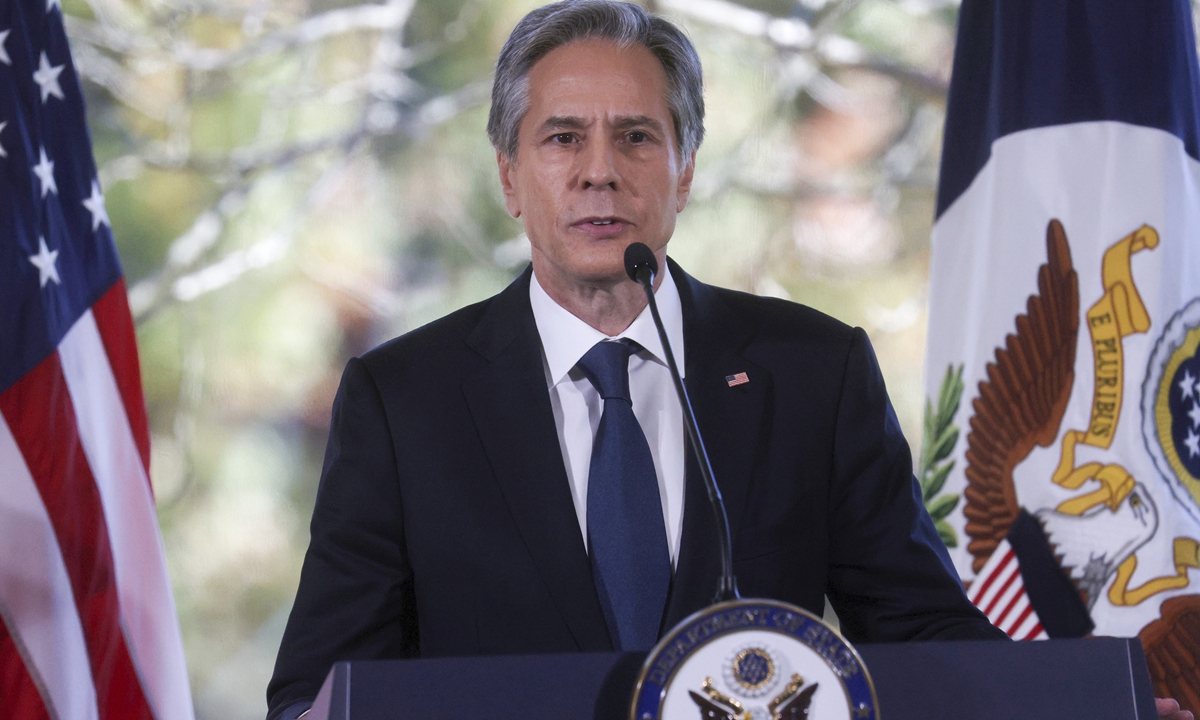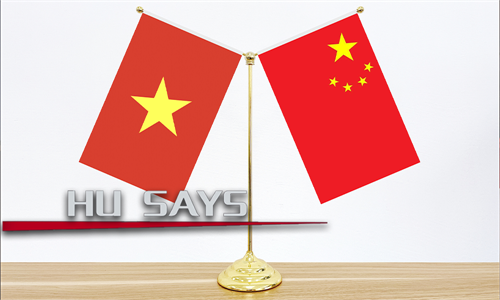
US Secretary of State Antony Blinken Photo: VCG
The purpose of US Secretary of State Antony Blinken's visit to Vietnam is crystal clear - to drive a wedge between China and Vietnam as well as the rest of the region.
On Saturday, the visiting US Secretary of State said in Vietnam that the US is helping regional countries strengthen what it calls maritime domain awareness particularly when it comes to things like "any use of coercion by other countries." The Chinese Embassy in Vietnam, in a response, said that attempts by external countries to sow discord in the region based on the Cold War mentality and the need to maintain their hegemony will not win the hearts of the people and are doomed to fail.
Since General Secretary of the Communist Party of Vietnam Central Committee Nguyen Phu Trong's visit to China last October, China-Vietnam relations have been flourishing, with friendly cooperation becoming the mainstream, and both sides staying on the same page to jointly manage differences and conflicts. In terms of the South China Sea issue, their consensus outweighs divergences and both countries are exploring a path of joint development.
Recently, US officials have had a number of interactions with their Vietnam counterparts, and the theme of Blinken's visit is nothing new. First, he praised Vietnam, continued to tout Vietnam's "leadership" in the Mekong region, spoke highly of the current state of the US-Vietnam relationship, and stated that the US is "committed to supporting a strong, prosperous, independent, and resilient Vietnam."
Second, high on the agenda has been strengthening trade and investment ties, supporting Vietnam's energy transition and response to climate change.
Third, Blinken peddled the Indo-Pacific Strategy and wooed Vietnam to cooperate within the US-ASEAN and US-Mekong frameworks, attempting to rope Vietnam in the US-led system.
Fourth, Blinken has continued to lobby Vietnam to upgrade its relationship status.
It is clear that Washington is eager to rope in Vietnam. This comes from an outdated Cold War mentality, in an attempt to drive a wedge between China and Vietnam, and build an encirclement to contain China. But this is wishful thinking by the US. Like other Southeast Asian countries, Vietnam has a clear view of its own interests, and Washington's motivations of seeking courtship with it . Its China policy will not be easily impacted by the US.
Regarding Blinken's visit, Hanoi still maintains its cautious attitude consistently. It can be clearly seen that Blinken's visit was not accompanied by adequate coverage by Vietnam's media outlets. In terms of the US' much sought-after upgrade of relationship, Vietnam's response remains tepid.
This resulted from many structural contradictions between the two countries, particularly with the intensifying US criticisms on Vietnam over democracy and human rights, which Vietnam is very wary of. Before his trip, Western human rights group called on Blinken to pressure Vietnam on democracy and human rights issues. And the Southeast Asian nation is on the US' special watch list on religious freedom.
While Vietnam is leverage for the US to geopolitically contain China, the US is not hesitant to wield its stick against Vietnam when their interests conflict. And Vietnam is still under constant threat of US economic sanctions.
On the whole, Vietnam is able to maintain strategic sobriety in front of the US' attempt to maintain supremacy, oppose communism, promote color revolutions globally and incite chaos and wars. It is worth noting that in 2016, Vietnam coined the idea of "bamboo diplomacy," a major diplomatic achievement since its reform and opening up. Under the guidance of "bamboo diplomacy," Vietnam continues to pursue an independent and diversified multilateral diplomatic route, making more friends and responding to global changes flexibly, as well as exploring a foreign policy with Vietnamese characteristics.
Noticeably, once tied to the US' anti-China chariot, Vietnam won't be able to realize its goal of becoming "a reliable partner of international community" and a strong country, nor can it contribute to regional prosperity and stability. It is believed that Vietnam can make its own rational judgment and balance relations between great powers, which is the most realistic choice for Vietnam's future.
The author is an assistant research fellow of the Institute of South and Southeast Asian and Oceania Studies at the China Institutes of Contemporary International Relations. opinion@globaltimes.com.cn

